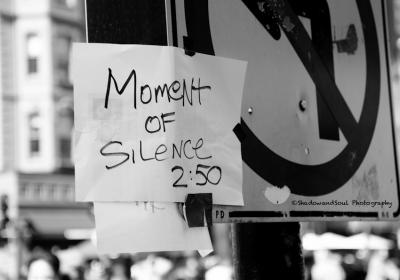The noise started in the middle of the night—sirens, popping—and then a phone call came from husband’s office at five o’clock in the morning telling him not to come to work.
For the next day, we remained in our Watertown apartment while law enforcement officials searched for the remaining Boston bombing suspect. We didn’t know how long the so-called “siege” would last, and as law enforcement moved closer and closer to where we lived, we wondered what their search meant for our community. We were amazed that the residents of our town followed the voluntary order to remain indoors, and we imagined that they, like us, genuinely wanted to help the search efforts. If our remaining at home could create some resolution for those harmed in the bombings, then of course we would stay indoors for however long we needed to.
|
photo: shadowsoul/Flickr/CreativeCommons |
Now that several months have passed since the siege, the feelings that I remember most are the mixture of monotony and fear that accompanied the waiting. Throughout the day, as the sirens and popping noises continued, we feared what every new burst signaled: We feared that the siege might go on for days, and we would run out of food. We feared that the suspect might be in our building, hiding in a stairwell, in an accomplice’s apartment. Puncturing these moments of fear were minutes of monotony: While newscasters repeated for hours that there was nothing new to tell, I cleaned my closet. I baked a cake. My husband read some comics. We waited some more. Relatives called. Friends called, many from YDS. We continued to wait.
That waiting was uncomfortable, just as waiting always is, but what made it easier was the presence of my husband, our family, and our friends. I never felt alone that day.
As I reflect on the day we waited in our Watertown apartment, it occurs to me that waiting is so much of what we do in our lives: We wait for the right spouse to come along. We wait for the right time to have a baby. We wait for our YDS admission letter or our doctoral admission letter or a job opportunity or medical test result or a vacation. Our faith lives are a microcosm of that: We wait for a deeper understanding of evil. We wait with Jesus on Maundy Thursday night. We wait in prayer.
I think it’s tempting to reduce the power of waiting to its outcome—phrases like, “It was worth the wait,” signify just this. But as a person of faith, I think there’s something to be learned in the waiting, in the discomfort itself. I imagine what each of us learns is different but each and every piece of wisdom is hard won, and I like to think that faith helps give a vocabulary for those discoveries. For me, my time at YDS studying evil and trauma certainly helped me process and express my experiences in Watertown. It also gave me a community and a stronger faith to rely on during a tough time.
But even if waiting teaches something, it’s still hard. It’s not desirable. And while the waiting is over for me, I know it persists for many in much more challenging ways. It persists for those who lost limbs in the bombing and who now need to learn to navigate the world differently than they did before. It persists for Dhzokhar Tsarnaev as he readies himself for trial. It persists for millions who live with chronic illness, in war-torn neighborhoods, in the midst of trauma, or in financial hardship. I hope for them that the wait will end. I also hope that we, as members of the YDS community, can have the courage to hear the stories of those who wait. I hope we will try to wait alongside them, just as the YDS community did for me during the Watertown siege. And I hope we will be willing, in all our many ministries, to share the wisdom of waiting with the world.
| Attachment | Size |
|---|---|
| 4.48 KB |
